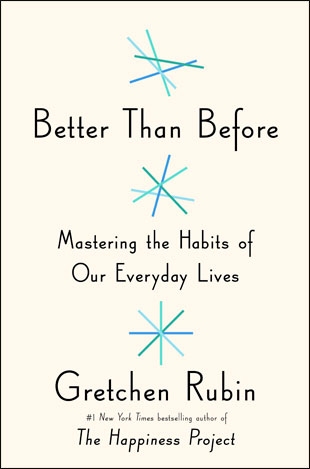Gretchen Rubin is the author of several books including the bestselling Forty Ways to Look at Winston Churchill and Forty Ways to Look at JFK. She began her career in law and was clerking for Supreme Court Justice Sandra Day O'Connor when she realized that she really wanted to be a writer.
Rubin is married, has two small children, and lives in New York City. One April day, she was struck by the thought that she was in danger of wasting her life. So she decided to begin a Happiness Project involving a blog, charts, deliverables, to-do lists, and evaluations of all scientific studies and books on the subject. She focuses on a different topic each month of the year. The results: two New York Times bestsellers, The Happiness Project and Happier at Home.
Now Rubin is ready to take on one of the foundational dimensions of our lives — habits. She calls them the invisible architecture of daily life: "We repeat about 40% of our behavior almost daily, so our habits shape our existence, and our future. If we change our habits, we change our lives."
Easier said than done.
Before plunging into changes we might want to make, Rubin divides people into four types:
1. Upholders who quickly and efficiently take on whatever must be done.
2. Questioners who respond to the process only if they feel it makes sense.
3. Obligers who meet outer expectations but resist the inner ones.
4. Rebels who resist both outer and inner expectations.
These Four Tendences prove that everyone is going to be different in the ways in which they deal with their habits. Rubin then moves on to a look at Four Strategies which play major roles in habit formation. She then gets into the thick of things with advice on first steps, ease, inconvenience, distractions, and treats.
Rubin discovers that habits are both tough and fragile — just like us. One study revealed that people spend about one-fourth of their waking time resisting some aspect of desire. Faced with that kind of firepower, it's no wonder we find changing bad habits such a frustrating ordeal.
But then there is the delight of strengthening good habits by rewarding ourselves with treats. Rubin finds pleasure in visiting a library, copying favorite quotes from a book, or going to bed early. But even here, there are dangers of unhealthy treats which are self-destructive.
It is interesting that Rubin's project is similar to what the Desert Fathers and Mothers did in their monastic cells: they practiced getting rid of bad habits and mustering the willpower to acquire spiritually rich new habits. You can turn things around in your life through self-help or through spiritual counsel. Either way the choice is yours and the challenges and rewards of changing your habits is tantalizing!
